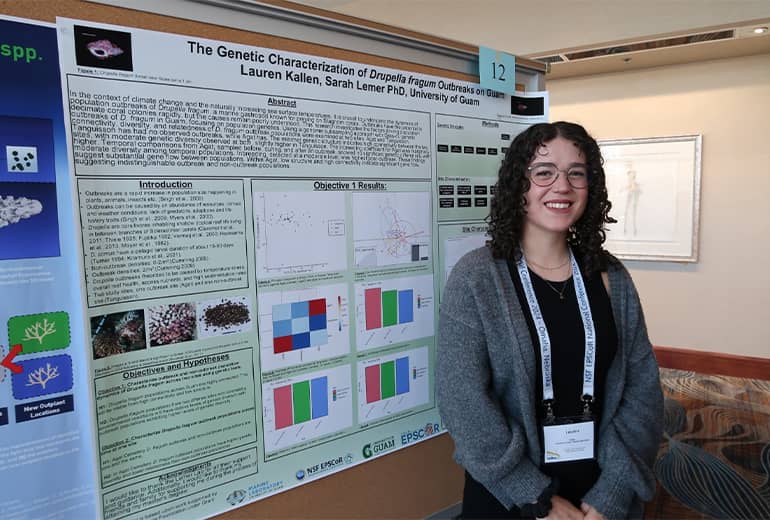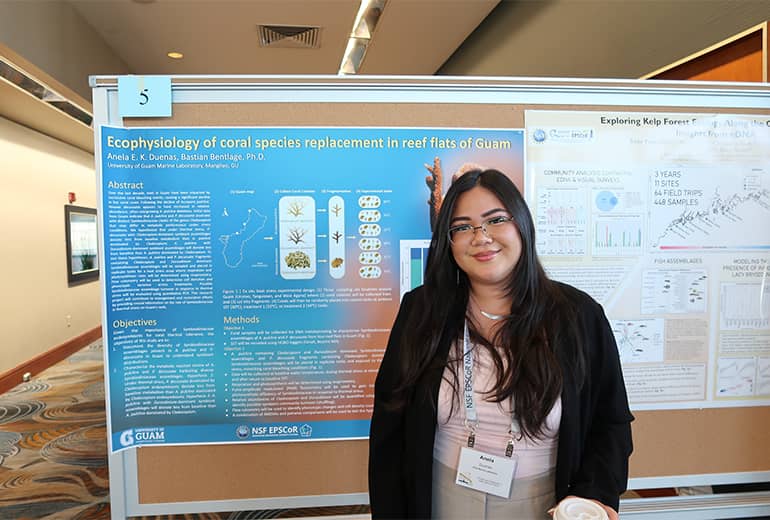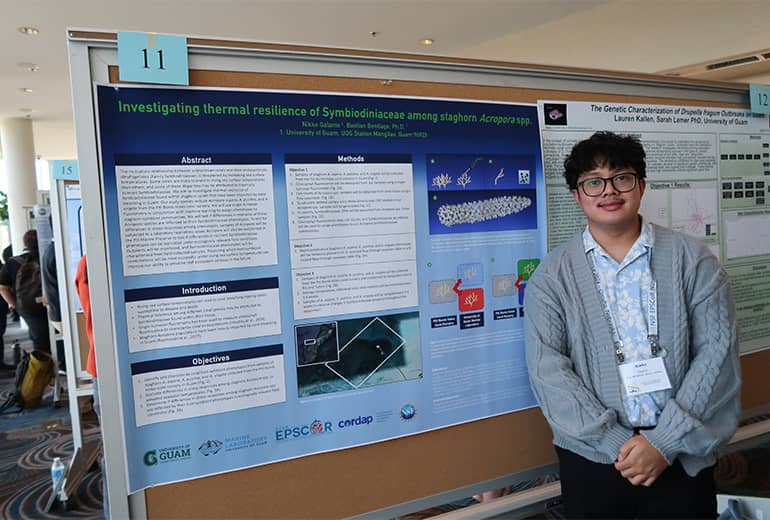UOG EPSCoR graduate students spotlight coral research at national conference
UOG EPSCoR graduate students spotlight coral research at national conference
UOG EPSCoR graduate students spotlight coral research at national conference
11/19/2024
During the 28th National Science Foundation Established Program to Stimulate Competitive Research (NSF EPSCoR) conference, graduate students from the University of Guam presented research that may contribute to coral reef restoration and recovery efforts on the island.
The graduate research assistants or GRAs, all supported by Guam NSF EPSCoR, participated in the research poster presentations in Omaha, Nebraska.
NSF Director Sethuraman Panchanathan served as keynote speaker, delivering the talk “Innovation Anywhere, Opportunities Everywhere: Accelerating Science and Technology Through Talent, Ideas, and Innovation.”
"The representation of our island at the NSF EPSCoR National Conference is important because it highlights the growing capacity of our university to conduct research in marine and coastal sciences, as well as to train and mentor a new generation of scientists who possess a deep understanding of our land and ocean resources,” said UOG President Anita Borja Enriquez, DBA. “Participating in this conference positions us as a thriving research hub for Guam and the entire region.”
For Guam NSF EPSCoR Principal Investigator and Project Director Terry Donaldson, PhD, the Guam NSF EPSCoR team showcased innovative research in one of the nation's most diverse and intricate marine and coral ecosystems. He said the conference also highlighted the increasing participation and representation of UOG students in STEM.
“This achievement was made possible through the support of the National Science Foundation's EPSCoR Program, which has been instrumental in fostering research and collaboration in Guam and the region. The conference also provides, through networking opportunities, pathways for student advancement in post-graduate training and entry into the workforce," Donaldson said.
The following Guam NSF EPSCoR GRAs presented at the conference:
- Xavier De Ramos
- Anela Duenas
- Nikko Galanto
- Lauren Kallen
- Reilly Kleven
- Diana Noto
- Andrew O'Neil
Kallen's poster, titled “The genetic characterization of Drupella fragum outbreaks on Guam,” focused on Drupella fragum, a sea snail that feeds on reef-building staghorn corals.
In the abstract, Kallen highlighted the importance of understanding the dynamics of Drupella fragum population outbreaks, as these outbreaks have the potential to decimate coral colonies rapidly.
While the causes of these outbreaks “remain poorly understood,” the research theorizes that they may be linked to temperature stress and overall reef health, among other factors.
Galanto's research on “Investigating thermal resilience of Symbiodiniaceae among staghorn Acropora spp.” aims to investigate the thermal resilience of Symbiodiniaceae, a type of alga that has a symbiotic relationship with staghorn corals.
“Some corals are more tolerant to rising sea surface temperatures than others, and some of these disparities may be attributed to thermally tolerant Symbiodiniaceae,” Galanto’s research states.
Like Galanto, Anela Duenas’ poster presentation, “Ecophysiology of coral species replacement in reef flats of Guam,” examines the effects of thermal stress on coral species with Symbiodiniaceae.
“Over the last decade, reefs in Guam have been impacted by coral bleaching events, causing a significant decline in live coral cover,” Duenas says in the abstract. “This research project will contribute to management and restoration efforts by providing crucial information on the role of Symbiodiniaceae in thermal stress on Guam’s reefs.”
According to Bastian Bentlage, PhD, associate professor of bioinformatics and Guam NSF EPSCoR co-principal investigator, the conference poster presentations exposed the team to diverse scientific research.
“Our team presented mostly on climate change impacts on our natural resources, particularly the marine sciences. The poster sessions are quite different from other subject matter conferences because it ranges the whole gamut,” Bentlage said.
For Cheryl Sangueza, PhD, associate professor at the UOG School of Education and student program coordinator for Guam NSF EPSCoR, empowering the students to participate in the EPSCoR National Conference not only enriches their academic journey but also amplifies their unique voices in the scientific community.
“When these young scholars share their insights and innovations, they demonstrate that diverse perspectives are crucial in shaping a more inclusive and progressive world of research. What I enjoy most is seeing how our University of Guam students represent our grants, our university, our island, and our region! Our students leave a memorable impression of our university and our island, and we take great pride in their work,” she said.
The national conference brought together hundreds of participants, including students, scientists, and administrators from 28 states and territories receiving research funding from NSF EPSCoR.



